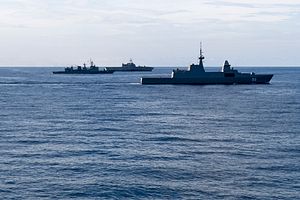This week, Singapore’s Defense Minister Ng Eng Hen is in Thailand for a three-day working visit. Ng’s trip has put the Singapore-Thailand defense relationship in the spotlight from a bilateral as well as a broader regional perspective.
As I have noted before, Singapore and Thailand have a close defense relationship (See: “Thailand’s New Army Chief Makes First Singapore Visit”). Bilaterally, beyond traditional aspects like exchanges, visits, and exercises, the Singapore Armed Forces (SAF) has also had an overseas training area in Thailand, one of several arrangements it has with countries including Australia and the United States (See: “Strengthening US-Singapore Strategic Partnership: Opportunities and Challenges”).
The two countries are also involved in multilateral interactions, whether it be established ones like Singapore’s full participation in the Cobra Gold exercises, which Thailand hosts, since 2000, or newer manifestations of trilateral cooperation between the two countries and the United States (See: “US, Singapore, Thailand Launch First Trilateral Exercise in the South China Sea”). Thailand is one of the United States’ two treaty allies in Southeast Asia (the other being the Philippines), while Singapore has long been one of Washington’s closest regional partners (See: “US-Singapore Defense Ties in the Spotlight Amid Trump-Lee Summit”).
Ng’s visit from November 5 to November 7 once again put the bilateral relationship into focus. During his visit toThailand, Ng, who was accompanied by other defense officials from the city-state, met with Thai Prime Minister Prayut Chan-o-cha as well as Thai Deputy Prime Minister and Minister of Defense Prawit Wongsuwon. He also attended the Asian Defense and Security Exhibition 2017 hosted by Thailand’s defense ministry and was scheduled to interact with Republic of Singapore Air Force (RSAF) personnel training in Thailand.
During Ng’s meetings, both sides discussed how they could work together in areas such as maritime security, counterterrorism, and cybersecurity, Singapore’s defense ministry (MINDEF) said in a statement. As I have discussed before, these issues have been a priorities for both sides bilaterally as well as in a broader regional context with anxieties over the Islamic State, tensions in the South China Sea, and growing cyber threats (See: “What Did the ASEAN Defense Meetings in the Philippines Achieve?”).
They also discussed how to strengthen their defense sides. MINDEF said that in Ng’s meetings with Prawit, they agreed to boost cooperation in particular areas such as navy-to-navy interactions and multilateral forums such as the ASEAN Defense Ministers’ Meeting (ADMM) and ASEAN Defense Ministers Meeting-Plus (ADMM-Plus). Singapore will be front and center next year as it will hold ASEAN’s annually rotating chair (See: “What’s Next For US-Singapore Ties Under Trump?”).

































